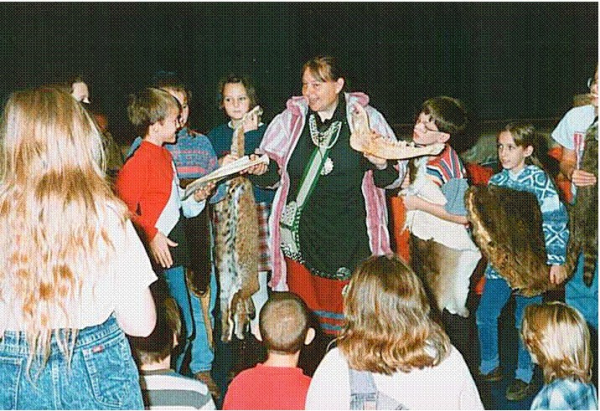 For most kids history is an ugly thought. Learning about history has about as much appeal as eating broccoli. Mention history to a lot of kids and their eyes glaze over with a look that says:
For most kids history is an ugly thought. Learning about history has about as much appeal as eating broccoli. Mention history to a lot of kids and their eyes glaze over with a look that says:
“OMG... here it comes ... another dry, boring, lecture about something I could care less about. When can I get back to texting my friends?”
Now, personally, I love history. Of course, I like broccoli, too, so what do I know? But I have always been fascinated by the events of the past. I think that may be because as an actor I have spent a fair amount of time researching different periods of history for acting projects, and then enjoyed bringing those periods to life. Visiting old forts, castles, houses or just fields where I know something really important happened is always exciting to me. As a result, reading about history has taken on new significance because I can relate the text to personal experience with places I have visited. I have trained my imagination to allow me to experience history as something fresh and living.
I have also found that when you try this approach with kids it works. But dragging your kids to some site of historical significance by itself won’t do it. The site needs to be interpreted in “kid-friendly” ways. A child must be given coaching in order to learn how to apply their vivid imaginations to the historical site. They must be taught to experience learning as a fun activity much as they have taught themselves the same thing about playing.
In every state (every state I know, at least) the Department of Education sets Academic Standards, and the standards for the intermediate grades (3-5) include learning the history their own state. Just so, in Ohio, the standards for 4th Grade Social Studies require teachers to teach about the events and people of Ohio’s past, including the Native American tribes, their culture and their interactions with European settlers. Thus we have these requirements:
History:
-Describe the earliest settlements in Ohio including those of prehistoric people
-Explain the causes and effects of the Battle of Fallen Timbers,on American Indians in Ohio and the United States.
People in Societies:
- Describe the cultural practices and products of various groups who have settled in Ohio over time.
a/ The Paleo Indians,Archaic Indians,Woodland Indians (Adena and Hopewell) and Late Prehistoric Indians (Fort Ancient)
b/Historic Indians of Ohio (Ottawa,Wyandot,Mingo, Miami,Shawnee and Delaware)
In Grade 5 we see this requirement:
History
Settlement
Explain how American Indians settled the continent and why different nations of Indians interacted with their environment in different ways.
But even going back to Grade 3 we find:
People in Societies
Cultures
Compare some of the cultural practices and products of various groups of people who have lived in the local community including:
- Artistic expression
- Religion
- Language
- Food
So ... how do enterprising teachers get all this across to kids without achieving the glazed over eye roll previously mentioned?
Well, good teachers always find ways to make things exciting in class, but a little help is always welcome. Field trips to historical sites nearby can help, but these sites are often underfunded and understaffed and lacking in the very “interpretation” discussed earlier and needed to bring the history to life. Besides, in this age of budget cuts, transportation is often a deal breaking expense.
My answer, no surprise, is to expose the kids to the excitement of history through a school assembly specifically designed to instill in students the very excitement so desired for the subject. In this case, a ready solution is found in Piankeshaw Trails.
Piankeshaw Trails brings into the school a museum quality array of Tribal artifacts, clothing, textiles and so on presented by a skilled historical interpreter who also happens to be a trained anthropologist and who was married to a Native American from a Midwestern tribe. Sheryl Hartman is a bubbly, fun, wealth of knowledge made exciting through humor and her enthusiasm for her subject. All the points touched on above from the Academic Content Standards are touched on and examined in this awesome school assembly, plus far more. Adding to the benefit is the fact that Sheryl’s knowledge allows her to pepper her commentary with references to and information about events that transpired near the school, where ever the school happens to be! And the excitement engendered in the students is real and lasting. I have witnessed kids literally crawling over their chairs and desks to get closer to the “action” in this super cool interactive school assembly.
So for Ohio, Piankeshaw Trails is a perfect school assembly for enriching the educational process and supporting the State Academic Standards. In fact, Piankeshaw trails works equally well in the same ways for schools in Indiana, Kentucky, Illinois and other midwestern states. For states in other parts of the country, other characters can be just as beneficial. Ben Franklin for anywhere out East comes to mind.

And in a similar manner, keep in mind that across much of the country Grade 8 spends much of the second half of the year studying American history from about 1809 through the end of the Civil War. And that just happens to coincide perfectly with the same years in which the life of our 16th president took place. And the events studied oftentimes coordinate perfectly with the events of Lincoln’s life. So it comes as no surprise that so many Middle Schools looking for appropriate assemblies for the students in Grade 8 have taken to scheduling a visit from Mr. Lincoln.
When you are seeking ideas for school assemblies, or alternatives to field trips, a historically based school show may the perfect event for you!
Geoff Beauchamp is the Regional Manager of Mobile Ed Productions where "Education Through Entertainment" has been the guiding principal since 1979. Mobile Ed Productions produces and markets quality educational school assembly programs in the fields of science, history, writing, astronomy, natural science, mathematics, character issues and a variety of other curriculum based areas. In addition, Mr. Beauchamp is a professional actor with 30 years of experience in film, television and on stage. He created and still performs occasionally in Mobile Ed's THE LIVING LINCOLN.







